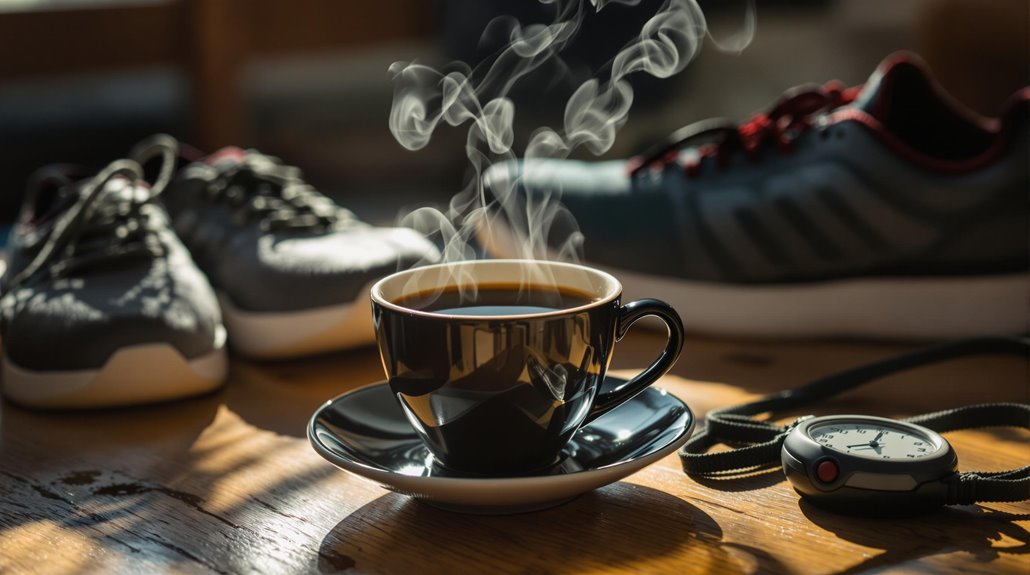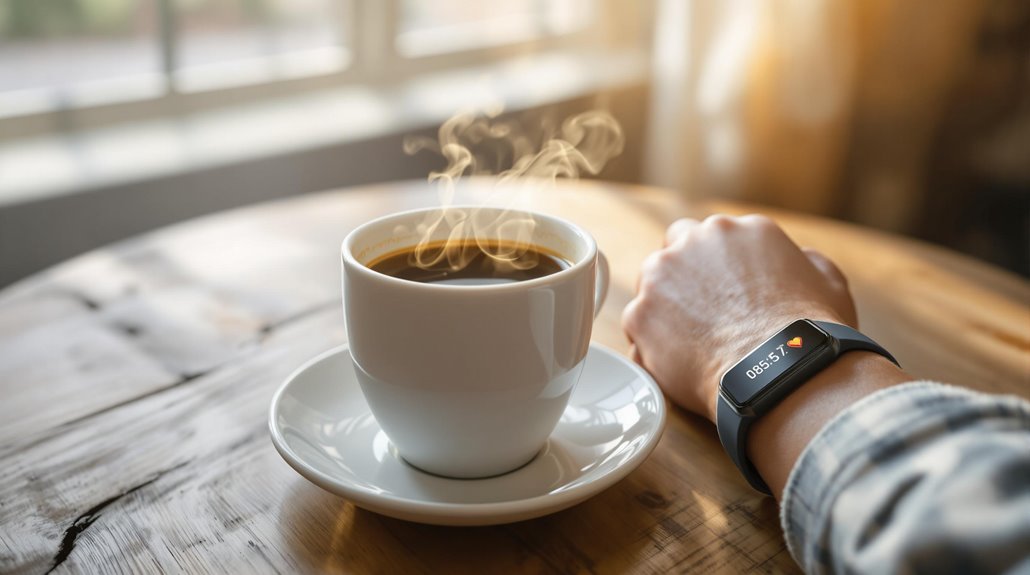







You might've noticed your morning coffee seems to give you a little extra energy, but did you know it could also play a role in weight loss? Caffeine can boost your metabolism and help your body burn fat more efficiently, while also curbing your appetite. But here's the catch: not all coffee habits are created equal. The way you drink it—and when—can make all the difference. So, is your daily cup truly helping you shed pounds, or could it be working against you? The answer lies in the details you've probably never considered.
Key Takeaways
- Coffee boosts metabolism and fat burning by increasing resting metabolic rate and promoting fat oxidation, especially when consumed before exercise.
- Caffeine in coffee suppresses appetite by reducing hunger hormones like ghrelin and increasing fullness hormones like peptide YY.
- Drinking coffee before workouts enhances exercise performance, fat utilization, and calorie burn, improving weight loss efforts.
- Excessive coffee consumption or high-calorie additives like sugar and cream can counteract weight loss benefits and cause side effects.
- For best results, drink black coffee in moderation, pair it with a balanced diet, and avoid late-day consumption to prevent sleep disruption.
How Coffee Affects Metabolism
Coffee's impact on metabolism is one of its most studied effects, particularly due to its caffeine content. When you drink coffee, caffeine stimulates your nervous system, which can increase your resting metabolic rate (RMR) by 3–11%. This means your body burns more calories even when you're at rest. The boost in metabolic rate is linked to caffeine's ability to enhance thermogenesis, a process where your body generates heat and burns energy. Studies, such as one published in *Food & Function* in 2012, suggest that caffeine also promotes fat oxidation, helping your body use fat as fuel more efficiently.
However, the extent of coffee's effect on metabolism can vary. Lean individuals often experience a more pronounced increase in metabolic rate compared to those who are obese. While coffee can temporarily elevate calorie expenditure, it's not a magic solution for weight loss. The metabolic benefits are modest and depend on factors like your caffeine tolerance and overall health. To maximize these effects, pair coffee with a balanced diet and regular exercise, as relying solely on caffeine won't lead to significant weight changes.
Coffee's Role in Fat Burning

Caffeine, a key component of coffee, plays a significant role in enhancing fat-burning processes in the body. Studies show that caffeine increases fat oxidation by 10-29%, depending on dosage and individual tolerance. This occurs because caffeine stimulates the release of epinephrine, a hormone that signals fat cells to break down stored fat into free fatty acids, which are then used as energy. When you consume coffee before exercise, it can further enhance fat oxidation, particularly during aerobic activities like running or cycling. Additionally, caffeine boosts your metabolism by increasing thermogenesis, a process where your body generates heat and burns calories. Research published in *Food & Function* supports this, showing that caffeine can elevate calorie burn. Coffee also contains chlorogenic acid, a compound that enhances the efficiency of fat breakdown. Together, these mechanisms make coffee a potential ally in fat burning. However, individual responses vary, and excessive caffeine intake may lead to side effects like jitteriness or disrupted sleep. For best results, moderate coffee consumption, combined with a balanced diet and regular exercise, can support your fat-burning goals.
Caffeine and Appetite Suppression

Caffeine may help reduce hunger by influencing hormones like ghrelin, which regulate appetite, potentially making you feel less hungry in the short term. Drinking coffee, especially in the morning, has been shown to suppress appetite temporarily, which could support weight management efforts. However, the effects vary depending on your sensitivity to caffeine, and long-term appetite suppression isn't consistently proven.
Caffeine Reduces Hunger Hormones
By influencing key hormones that regulate hunger, caffeine can play a role in reducing appetite and supporting weight management efforts. Drinking coffee, which contains caffeine, may help you lose weight by suppressing ghrelin, the hormone responsible for stimulating hunger. Studies show that caffeine can reduce ghrelin levels by up to 30% in some individuals, curbing the urge to eat. Additionally, caffeine stimulates the release of peptide YY, a hormone that promotes feelings of fullness, further aiding appetite control. A 2014 study found that participants who consumed caffeine reduced their calorie intake by 10%, suggesting a potential link between caffeine and fat loss. These effects are more pronounced in individuals with lower caffeine tolerance, as their bodies may respond more strongly to its appetite-suppressing properties. While caffeine's impact on hunger hormones can support weight loss, it's important to remember that results vary based on individual factors like metabolism and tolerance. Incorporating coffee into a balanced diet and active lifestyle may enhance its benefits, but it shouldn't replace sustainable weight management strategies.
Short-Term Appetite Suppression Effects
The impact of caffeine on hunger hormones extends to its ability to suppress appetite in the short term. Drinking coffee can help you eat less by temporarily reducing feelings of hunger, which may lead to lower calorie intake. Research suggests that caffeine influences appetite-regulating hormones like ghrelin, contributing to this effect. For example, studies indicate that caffeine consumption can decrease calorie intake by 10-20% in the hours following ingestion. However, the appetite-suppressing effects of coffee aren't universal. A 2017 study found that while caffeine reduced appetite in men, its impact on women was inconsistent. Timing also plays a role; coffee's ability to curb hunger is most noticeable in the morning, potentially helping you consume fewer calories at breakfast. These effects typically last 3-4 hours, depending on your metabolism and caffeine tolerance. While drinking coffee may help you eat less in the short term, individual responses vary, and its appetite-suppressing benefits are temporary. Balancing coffee intake with mindful eating habits is key to leveraging its potential for weight management.
Morning Coffee and Hunger Control
Starting your day with a cup of coffee might help you feel less hungry in the morning, thanks to its ability to influence key appetite-regulating hormones. Morning coffee acts as a natural appetite suppressant by increasing levels of peptide YY, a hormone that promotes feelings of fullness, while temporarily reducing ghrelin, the "hunger hormone." Studies show that caffeine's effects on ghrelin can last up to three hours, helping you manage hunger control more effectively. Drinking black coffee on an empty stomach enhances these effects, making it a strategic choice for curbing mid-morning snack cravings and reducing overall calorie intake. Research, including a 2017 study, supports this by demonstrating that caffeine intake before breakfast markedly lowers hunger and increases satiety compared to a placebo. However, while morning coffee can aid in appetite suppression, it's important to pair it with a balanced diet and healthy eating habits for sustainable weight management. Over-reliance on caffeine alone isn't a long-term solution, but it can be a helpful tool when used mindfully.
Coffee's Impact on Exercise Performance

Coffee can enhance your endurance levels during exercise, potentially improving performance by 11–12%. It also increases fat utilization for energy, especially when consumed about 30 minutes before a workout. Additionally, caffeine's thermogenic effects may boost workout intensity and calorie burn, supporting your weight loss goals.
Enhanced Endurance Levels
How does coffee enhance your endurance during exercise? Coffee really helps by stimulating your nervous system, which increases adrenaline production. This energy boost prepares your body for prolonged physical activity, allowing you to burn more calories and sustain effort for longer periods. Studies show that consuming coffee about 30 minutes before exercise can improve endurance by 12-15%, making it a valuable tool for aerobic activities like running or cycling. The caffeine in coffee also enhances fat oxidation, enabling your body to use fat as a primary energy source during extended workouts. A 2020 study found that taking 3-6 mg of caffeine per kilogram of body weight markedly improved time-to-exhaustion in endurance athletes. These effects are particularly pronounced in trained individuals, with performance benefits lasting up to six hours post-consumption. By optimizing your energy utilization, coffee helps you push harder and longer, making it a practical addition to your pre-workout routine. However, individual responses vary, so it's important to experiment with timing and dosage to find what works best for you.
Increased Fat Utilization
Beyond boosting endurance, coffee also plays a significant role in enhancing fat utilization during exercise. Caffeine, the active compound in coffee, stimulates the release of fatty acids into your bloodstream, making them more available for energy production. This process, known as fat oxidation, can increase by up to 29% during exercise, allowing your body to burn fat more efficiently. Studies show that consuming coffee 30 minutes before aerobic activity can boost fat-burning efficiency by 10-12%, maximizing fat metabolism and energy expenditure.
Caffeine achieves this by activating your nervous system, which signals fat cells to break down stored fat into fatty acids. These fatty acids are then used as fuel, particularly during moderate-intensity workouts. For ideal results, aim for a caffeine dose of 3-6 mg per kilogram of body weight before exercise. This range maximizes fat utilization without overstimulation. By enhancing fat oxidation, coffee helps you tap into stored fat reserves, supporting weight management and improving exercise performance. However, individual responses to caffeine vary, so it's important to monitor how your body reacts to find the right balance.
Improved Workout Intensity
Caffeine's ability to enhance exercise performance is well-documented, with studies showing it can boost workout intensity by 11-12% on average. When you consume coffee about 30 minutes before exercising, caffeine stimulates your central nervous system, increasing adrenaline levels. This not only sharpens focus but also improves fat oxidation, allowing your body to use fat as a primary energy source during aerobic activities. Research indicates that caffeine can elevate fat oxidation by 10-29%, depending on dosage and individual tolerance, which supports sustained energy during workouts.
Additionally, caffeine enhances thermogenesis, leading to higher calorie burn both during and after exercise. A 2012 study in *Food & Function* highlighted this effect, showing that caffeine intake before workouts can amplify calorie expenditure. For ideal results, aim for a dose of 3-6 mg of caffeine per kilogram of body weight. Trained individuals often experience more pronounced benefits, as their bodies efficiently utilize caffeine to maximize workout intensity. By improving endurance and energy output, caffeine helps you push harder, burn more calories, and achieve better fitness outcomes. However, individual responses vary, so it's important to monitor your tolerance and avoid overconsumption.
Potential Downsides of Coffee for Weight Loss

While coffee can support weight loss, it's important to evaluate its potential downsides. Excessive caffeine intake may lead to increased anxiety, jitteriness, and disrupted sleep, which can hinder your weight loss efforts by affecting energy levels and recovery. Additionally, adding sugar, cream, or flavored syrups to your coffee introduces extra calories that can counteract its benefits. High-calorie coffee beverages, such as lattes or frappuccinos, are particularly problematic, as they can contribute to weight gain over time if consumed regularly. Another concern is caffeine tolerance, which develops with frequent use and diminishes coffee's metabolic and fat-burning effects. Over time, you may need more caffeine to achieve the same results, potentially leading to overconsumption. Moreover, excessive coffee intake can cause dehydration, impairing metabolism and overall health. To maximize coffee's weight loss potential, it's essential to consume it mindfully, avoiding calorie-dense additives and moderating your intake to prevent negative side effects. By being aware of these downsides, you can make informed choices that align with your weight loss goals.
Best Practices for Drinking Coffee to Aid Weight Loss

To maximize coffee's potential for weight loss, it's crucial to adopt mindful consumption habits. Start by drinking black coffee to avoid added calories from sugar, cream, or syrups, which can counteract its benefits. Black coffee can help increase your metabolic rate and burn fat more effectively. Timing matters too—drink coffee about 30 minutes before exercise to enhance fat oxidation and improve workout performance. However, limit your intake to 1-2 cups per day to prevent caffeine tolerance, which can reduce its metabolic effects over time. Pairing coffee with high-protein or fiber-rich meals can also promote satiety, helping you lose weight by reducing overall calorie intake. Avoid drinking coffee late in the day, as it may disrupt sleep, and poor sleep can hinder weight loss efforts. By following these practices, you can harness coffee's ability to support your weight loss goals while minimizing potential downsides. Remember, moderation and strategic consumption are key to making coffee work for you.
Disclosure: As an Amazon Associate, I earn from qualifying purchases.




